Armin van Buuren: la leggenda vivente della trance mondiale ci racconta cosa significa essere un’icona della musica.
Per questo secondo numero digitale di Parkett – il primo numero potete recuperarlo qui – abbiamo avuto il piacere di intervistare una delle icone della trance mondiale. Ci sono nomi in grado di ridefinire un genere, di cambiare per sempre le idee e la fantasia delle persone. Armin van Buuren è senza dubbio uno di questi.
Il DJ ha da poco completato la sua residency di un mese all’Ushuaïa di Ibiza in cui si è esibito per ben 5 domeniche. Dal primo di settembre fino all’ultima data, il 29, la leggenda della Trance mondiale ha proposto il suo spettacolo. Senza mai scendere a compromessi. Per l’occasione gli abbiamo rivolto alcune domande.
Non ha certo bisogno di presentazioni il DJ che per ben 11 anni è stato sul podio della classifica mondiale, vincitore di diversi Grammy e di tantissimi altri riconoscimenti. Eppure, leggendo l’intervista, siamo sicuri rimarrete stupiti dall’uomo che c’è dietro la star Armin. Il modo di porsi e di raccontare la storia che ha colorato le pagine della sua vita lascia senza parole.
Nella genuinità delle sue parole troverete nient’altro che la storia di un ragazzo – come tanti – che ha creduto fermamente nella sua passione. Una persona che si è messa in gioco costruendosi anche delle alternative. L’obbiettivo era però sempre lì, brillante come una stella: portare avanti il suo credo nella musica.
Armin van Buuren è una leggenda per tantissime ragioni. La più importante è senza alcun dubbio una: ha sempre creduto di poter fare la differenza. Questo è lo spirito che distingue leggende come il dj olandese da tutti gli altri: un spirito di abnegazione alla causa che lo spinge a guardare oltre, fuori dalle regole e dalla normalità. Insomma, per essere una leggenda ci vuole carattere. Solo così cambi il mondo. Della musica e non.
Per noi di Parkett rappresenta motivo di grande orgoglio, dato che quella che troverete nel numero digitale (quella di seguito è solo un’anteprima) è la prima intervista di Armin van Buuren per un magazine di settore in lingua italiana.
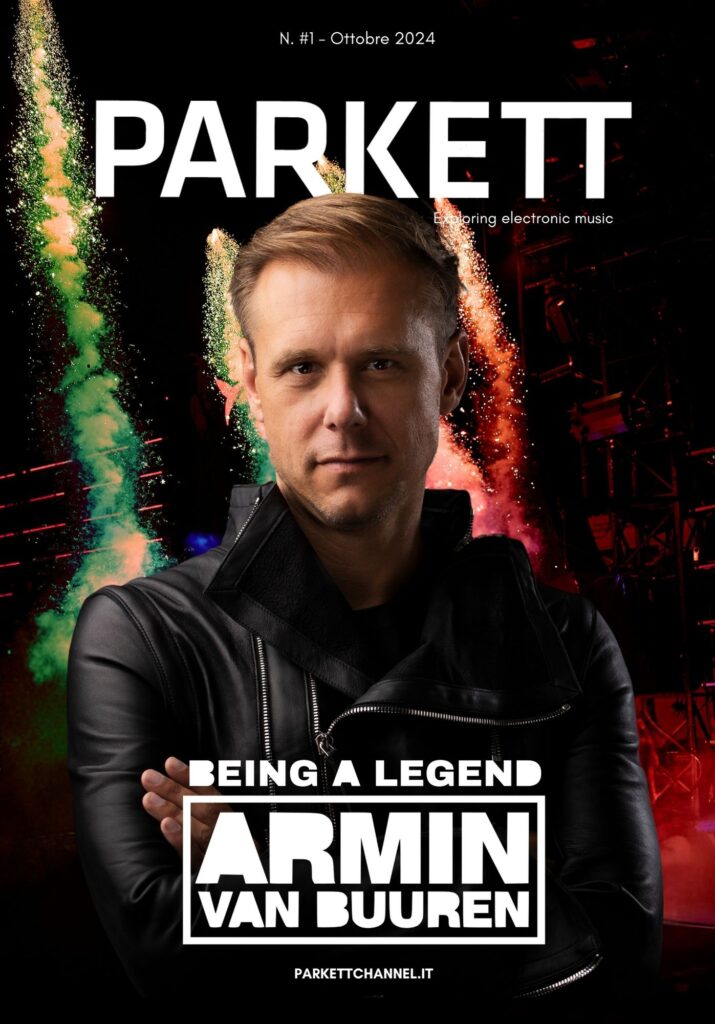
© Anteprima OTTOBRE: Cover Story “ARMIN VAN BUUREN. BEING A LEGEND”
Cominciamo con la persona dietro al DJ. In una dichiarazione Armin van Buuren ha detto: “Non è solo amore per la musica, è la mia passione. Va oltre il piacere e oltre un hobby. È uno stile di vita. La musica è essenziale nella mia vita“. Dopo tutti questi anni, cosa rappresenta la musica per te? Pensi di aver dovuto sacrificare troppo per seguire questo “stile di vita” o non cambieresti nessuna delle scelte fatte in passato?
Prima di tutto, penso che non si possa mantenere lo stile di vita da DJ se non si ha un sentimento così forte verso la musica (dance, ndr). È davvero uno stile di vita, perché i due sono indissolubilmente legati e devono esserlo affinché funzioni.
Detto questo, ci sono ovviamente dei sacrifici che devi fare, soprattutto quando si tratta della famiglia. Cerchi di gestire tutto per assicurarti che nessuno resti indietro, ma a lungo termine, è inevitabile prendere decisioni molto difficili.
“Cambierei alcune delle scelte fatte in passato?” (cita la domanda che gli abbiamo posto, ndr). Sapendo ciò che so ora, forse sì. Ma parte della crescita nella vita, sia come persona che nel modo in cui cerchi di combinare la vita da DJ con tutto il resto, può avvenire solo commettendo errori e imparando da essi.
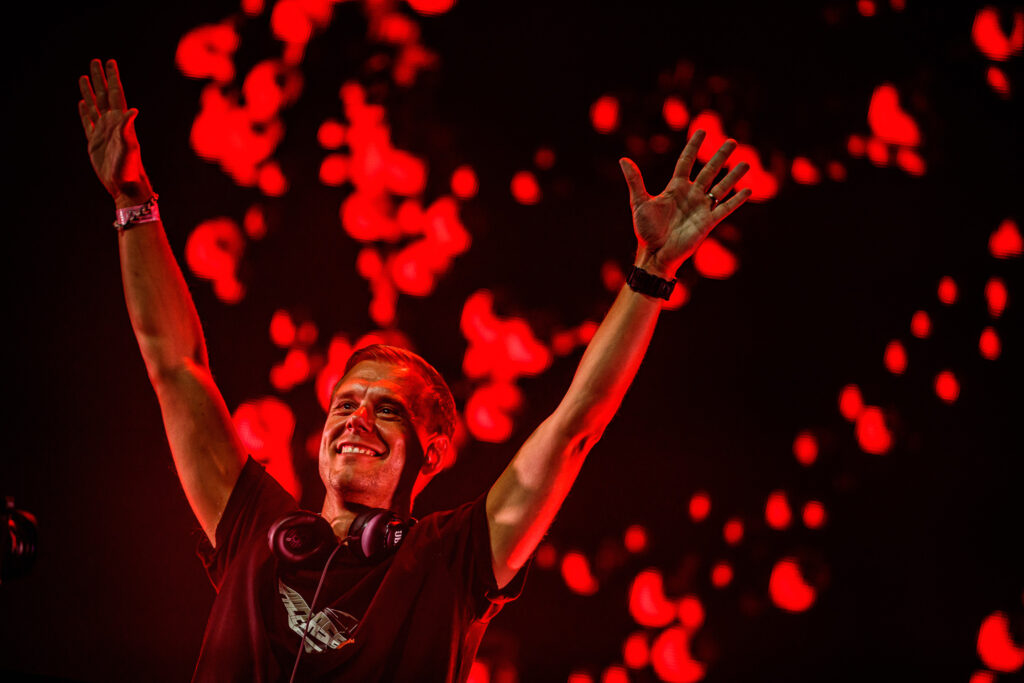
© In foto Armin van Buuren. (PH. Bart Heemskerk)
Riesci ad invidividuare tre passaggi chiave della tua carriera che hanno plasmato chi sei musicalmente ora?
È un po’ difficile identificare solo tre passaggi in una carriera che dura da oltre vent’anni. Ma credo che possiamo scegliere tre momenti significativi: l’inizio del mio programma radiofonico A State of Trance all’inizio degli anni 2000, la release di This Is What It Feels Like nel 2013 e, infine, il mio ultimo album, Breathe In.
Il primo rappresenta davvero la passione che ho per la musica dance e il desiderio di condividerla con persone di tutto il mondo e, fondamentalmente, con chiunque volesse ascoltarle. Anche ora, dopo oltre vent’anni, A State of Trance incarna ancora quella passione.
Il secondo, l’uscita di This Is What It Feels Like con Trevor Guthrie, è stato decisamente un passo fondamentale. Non tanto per il successo che ha avuto il brano, ma perché ha rafforzato in me la convinzione che spingersi fuori dalla propria zona di comfort e cercare di crescere, nonostante le possibili reazioni negative da parte dei fan, è una delle migliori cose che si possano fare come artista.
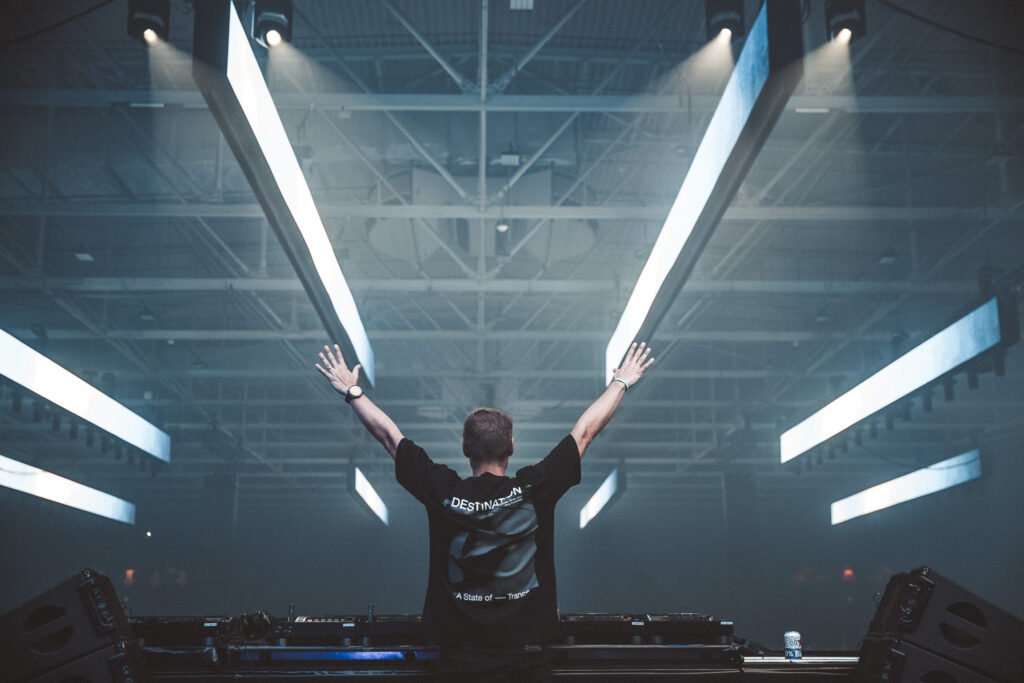
© In foto Armin van Buuren. (PH. Bart Heemskerk)
È ancora una delle cose più spaventose che io abbia mai fatto, ma guardando indietro ne è valsa davvero la pena. Non sarei chi sono oggi e non starei dove sono oggi se non fosse stato per quel momento di coraggio.
E infine, il mio album più recente, Breathe In. A volte, i passi fondamentali nella carriera di un artista non riguardano affatto la musica in sé. Per me, l’album tocca un periodo più oscuro in cui non ero felice e mi sentivo disconnesso da tutti, oltre che da me stesso. In quel periodo, ho finalmente e fortunatamente realizzato che avevo bisogno di un reset, che dovevo ristrutturare la mia vita, i miei obiettivi e le mie routine.
Con l’aiuto di tante persone a me vicine, ci sono riuscito. Liberarmi di quei pensieri più cupi mi ha fatto sentire libero e in equilibrio, specialmente in studio. Credo che dimostri quanto la componente mentale sia importante in un’industria come la nostra.
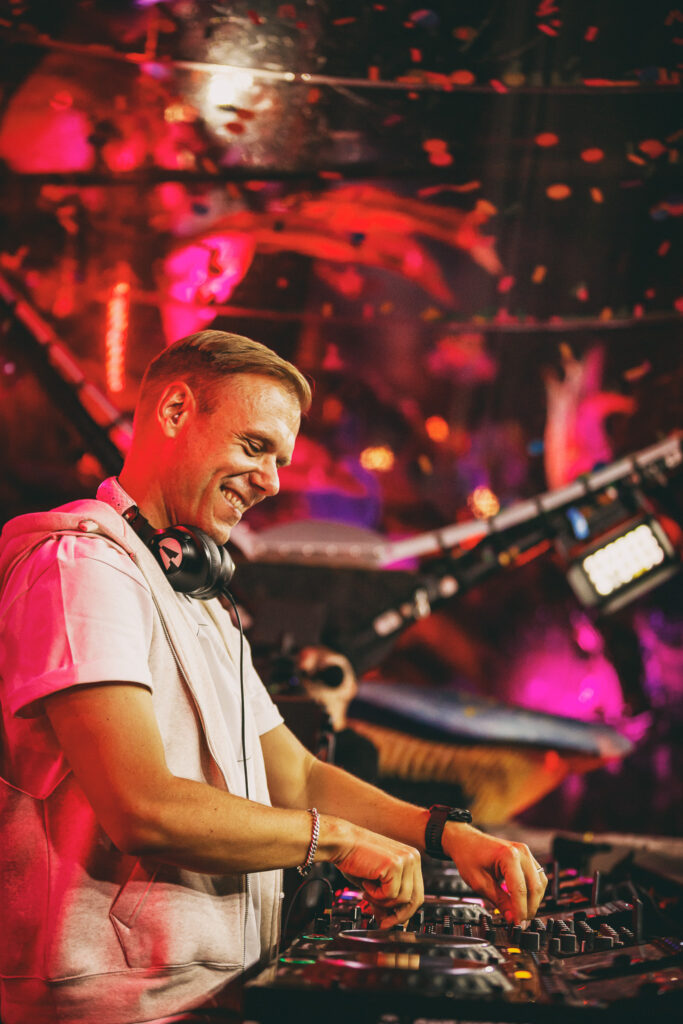
© In foto Armin van Buuren. (PH. Bart Heemskerk)
Hai iniziato a lavorare professionalmente nel 1996. Tutto è cambiato in modo così profondo. Qual è la differenza più grande che noti tra il passato e il presente? Per quanto riguarda la trance, pensi che la tua musica abbia cambiato questo genere?
Penso che l’intera industria della musica dance sia esplosa tra allora e oggi. Basta considerare l’ascesa di enormi festival ed eventi nei club, e quanto sia diventata rilevante a livello globale la musica dance al giorno d’oggi. Anche il modo di fruire la musica è cambiato moltissimo, passando dai vinili fisici e CD allo streaming online, che permette di ascoltare musica ovunque ci si trovi. Questi sono tutti cambiamenti molto significativi degli ultimi trent’anni circa.
Per quanto riguarda la musica trance, non sono sicuro che la mia musica sia stata fondamentale in questo senso, perché non credo che spetti a me deciderlo. Mi piace pensare che la mia musica abbia un’importanza e che significhi molto per molti ascoltatori in modi diversi, ma non mi considero un pioniere tanto quanto, ad esempio, Jean-Michel Jarre o Vangelis.

© In foto Armin van Buuren. (PH. Bart Heemskerk)
La tua musica e il tuo stile hanno ottenuto un ampio riconoscimento attraverso il programma Radio ID&T, disponibile anche online. All’epoca, sei stato molto lungimirante nel comprendere il potenziale di questo mezzo. C’è stato un momento in cui hai capito che gli occhi del mondo erano puntati sulla tua musica?
Non sono sicuro ci sia mai stato un momento di realizzazione improvvisa, perché sento che la mia “ascesa alla fama” è avvenuta in modo molto graduale. Oggigiorno, si può diventare una star globale da un giorno all’altro solo perché una tua traccia diventa virale sui social media. Questo non esisteva ai miei tempi.
Se mai c’è stata una realizzazione del genere, probabilmente è stata quando sono stato votato come DJ numero 1 al mondo per la prima volta o quando sono stato nominato ai Grammy con This Is What It Feels Like. Ma ciò che conta per me è come i miei fan percepiscono la mia musica e che io riesca a ispirarli e unirli con ciò che faccio. Quei premi sono un grande onore, ma non è per questo che sono in questo settore.

© In foto Armin van Buuren. (PH. Bart Heemskerk)
Un’altra cosa interessante che emerge dalle tue risposte è il forte legame che hai con i tuoi fan e gli amanti della musica trance in generale. È questa la cosa più importante per essere considerato un “buon DJ”?
Prima di tutto, è importante capire cosa rende qualcuno un buon DJ. “Sei un buon DJ se sei tecnicamente impeccabile?“, “Sei un buon DJ se sai quale traccia suonare al momento giusto?“.. Anche se avere abilità tecniche e talento è sicuramente importante, io propendo più per la seconda opzione.
Questo perché credo che, come DJ, tu debba offrire un’esperienza. Le persone vengono ai tuoi show con l’aspettativa di essere stupite, di divertirsi e di perdersi nella musica.
Per poter dare loro ciò di cui hanno bisogno, devi essere sintonizzato sui loro desideri e connesso alle persone e ai fan che vengono a vederti suonare. Quindi avere quella connessione non è l’unica cosa che rende un DJ “buono”, ma credo che giochi un ruolo fondamentale.
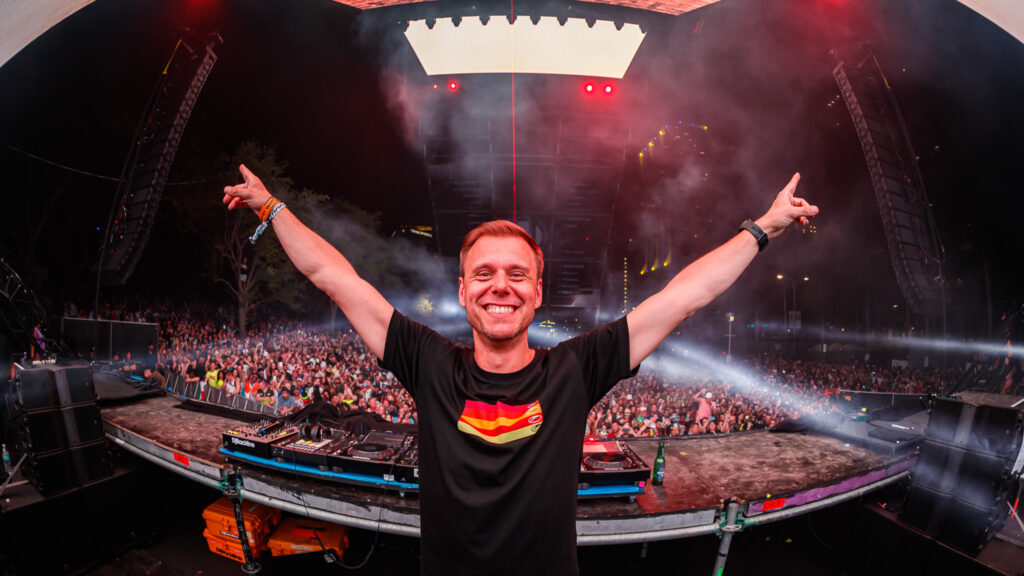
© In foto Armin van Buuren. (PH. Bart Heemskerk)
ENGLISH VERSION
Armin van Buuren, Cover Story: “Being a Legend”. Interview

© Armin van Buuren. (PH. Bart Heemskerk)
Armin van Buuren: The Living Legend of Global Trance Tells Us What It Means to Be a Music Icon.
For this second digital issue of Parkett – you can find the first issue here – we had the pleasure of interviewing one of the world’s trance icons. There are names capable of redefining a genre, of forever changing people’s ideas and imagination. Armin van Buuren is undoubtedly one of those names. The DJ recently completed his one-month residency at USHUAÏA in Ibiza, performing on five Sundays. From the first of September until the final date on the 29th, the global Trance legend delivered his show without ever compromising. On this occasion, we asked him a few questions.
The DJ, who spent 11 years on the top of the global rankings, a Grammy winner with countless other awards, certainly needs no introduction. Yet, reading the interview, we are sure you will be surprised by the man behind the fame. The way he presents himself and tells the story that has colored the pages of his life will leave you speechless.
In the genuineness of his words, you will find nothing but the story of a young man – like many others – who firmly believed in his passion. A person who took risks and also built alternatives for himself. However, the goal was always there, shining like a star: to carry forward his belief in music.
Armin van Buuren is a legend for many reasons, but the most important one is this: he always believed he could make a difference. This is the spirit that distinguishes legends like the Dutch DJ from everyone else: a spirit of dedication to a cause that pushes them to look beyond, outside the rules and norms. Armin van Buuren is living proof of this. In short, to become a legend, it takes character. Only then can you change the world—of music and beyond.
For us at Parkett, it’s a great source of pride, as the interview you’ll find in the digital issue – what follows here is just a preview – is Armin van Buuren’s first interview for a specialist magazine in the Italian language.
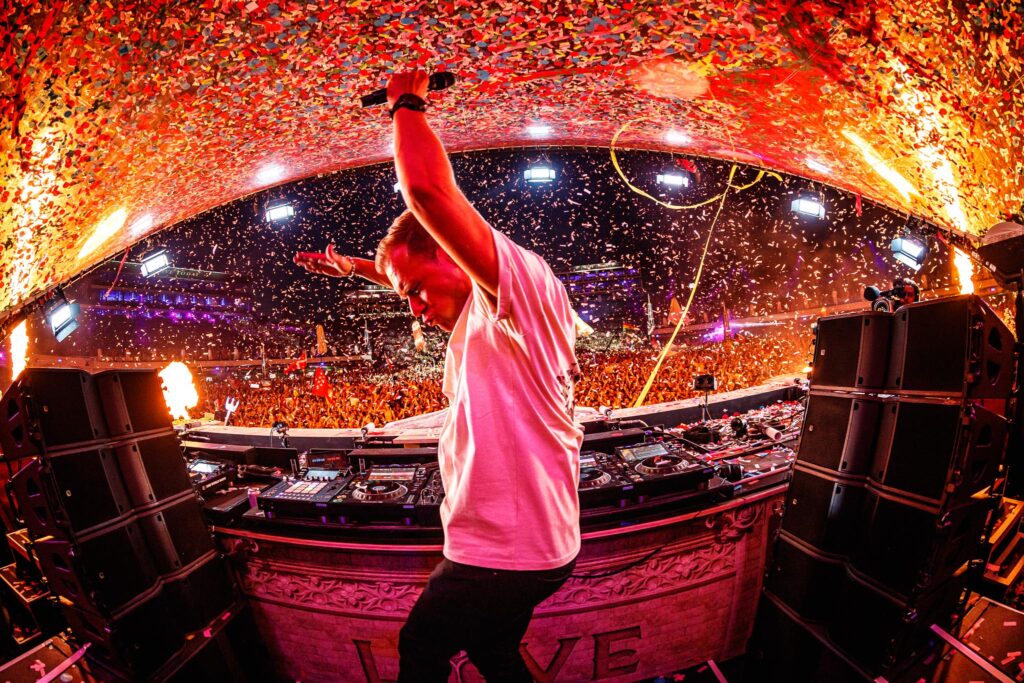
© In Photo: Armin van Buuren. (PH. Bart Heemskerk)
Let’s start with the person behind the DJ. In a statement, you said: “It’s not just love for music, it’s my passion. It goes beyond liking, and beyond a hobby. It’s about a way of living. Music is essential to my life.” After all these years, what does music represent to you? Do you think you had to sacrifice too much to follow this “way of living,” or would you not change any of your past choices?
First and foremost, I think you can’t possibly maintain the DJ lifestyle if you don’t feel as strongly about (dance) music. It indeed is a way of living, because the two are inextricably connected and have to be for it to work.
That being said, there are of course sacrifices that you have to make, especially when it comes to family. You try to juggle everything to ensure there’s no short end of the stick, but in the long term, there’s no getting around making very difficult decisions.
“Would I change some of the past choices I made?” Knowing what I know now, I just might. But part of growing in life, whether as a person or how you try to combine the DJ life with everything else, can only be done by making mistakes and learning from them.
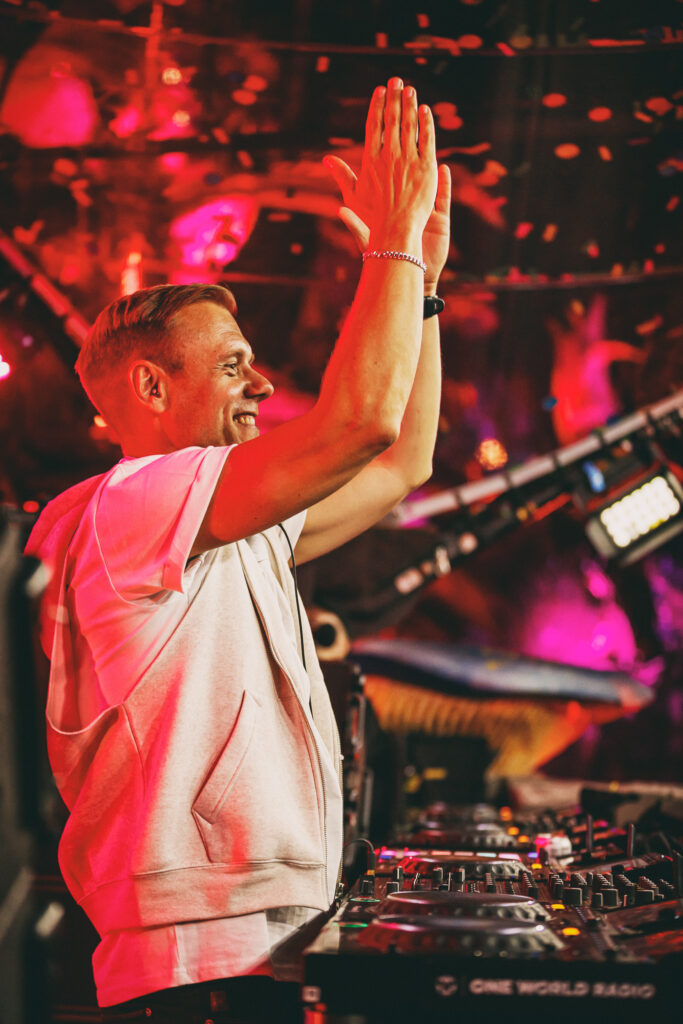
© In Photo Armin van Buuren. (PH. Bart Heemskerk)
Could you identify the three key steps in your musical career that have shaped who you are musically?
It’s a bit hard to pinpoint only three steps in a career that spans well over twenty years. But I guess we could narrow it down to the start of my A State of Trance radio show in the early 2000s, the release of ‘This Is What It Feels Like’ back in 2013, and finally, my latest album, ‘Breathe In’.
The first one really embodies the passion I have for dance music and the desire to share it with people from all over the world and, basically, whoever wanted to listen. Even now, over twenty years later, A State of Trance still channels that passion.
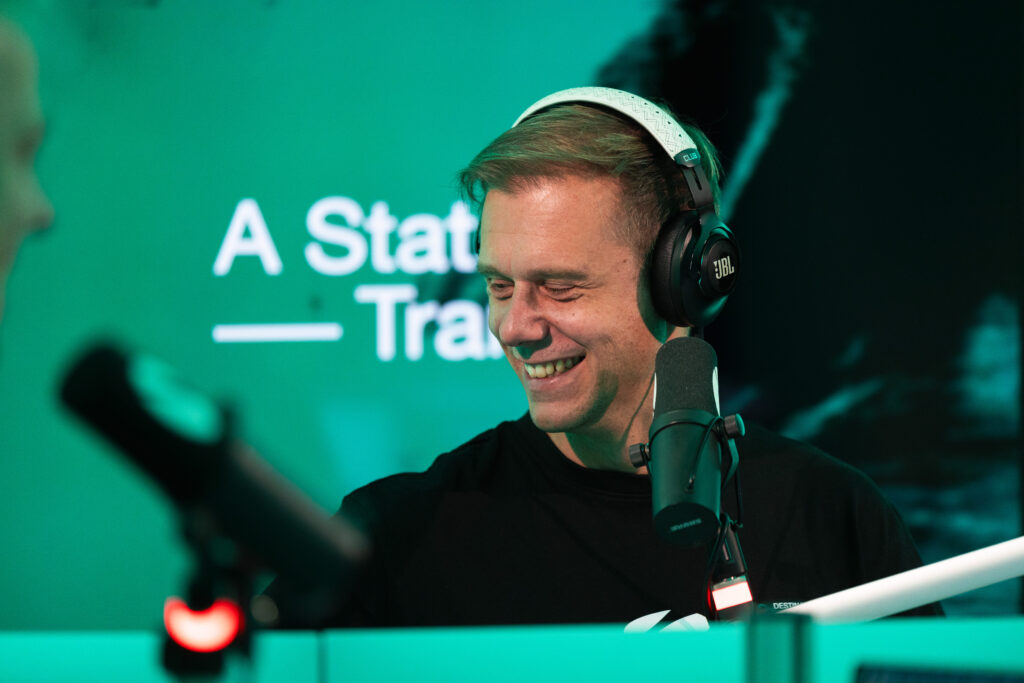
© Armin van Buuren
The second, the release of “This Is What It Feels Like” featuring Trevor Guthrie, definitely was a key step. Not because of how successful the track has been, but because it cemented the belief in me that pushing out of your comfort zone, that trying to grow as an artist despite the potential backlash amongst your following, is one of the best things you can do as an artist. It still is one of the scariest things I’ve ever done, but it was so worth it looking back. I wouldn’t be who I am and where I am today if it weren’t for that moment of courage back then.
And lastly, my recent released album, ‘Breathe In’. Sometimes, key steps in an artist’s career aren’t related to the actual music as all. For me, the album touches on a darker time when I wasn’t happy and felt disconnected from everyone as well as myself. In that period, I finally and luckily came to the realization that I needed a reset, that I needed to restructure my life, my goals and my routines. With the help of so many people close to me, I managed to do that. Getting rid from those darker thoughts made me feel liberated and balanced, especially in the studio. I guess it shows how much the mental side matters in a business like ours.

© In Photo: Armin van Buuren. (PH. Bart Heemskerk)
You began working professionally in 1996. Everything has changed so deeply. What is the biggest difference you notice between the past and the present? Regarding trance, do you think your music has changed this genre?
I think the whole dance music industry skyrocketed between then and now. Just consider the rise of massive festivals and club events, and how much global relevance dance music has nowadays. Music consumption changed a whole lot as well, from physical vinyl and CDs to streaming music online and being able to do so wherever you go. These are all very significant changes in the past thirty years or so.
Regarding trance music, I’m not sure my music has been seminal in a way, because I don’t think that’s for me to decide. I like to think that my music matters and that it means a lot to many listeners in myriad ways, but I don’t consider myself to be as much as a pioneer as, say Jean-Michel Jarre or Vangelis.
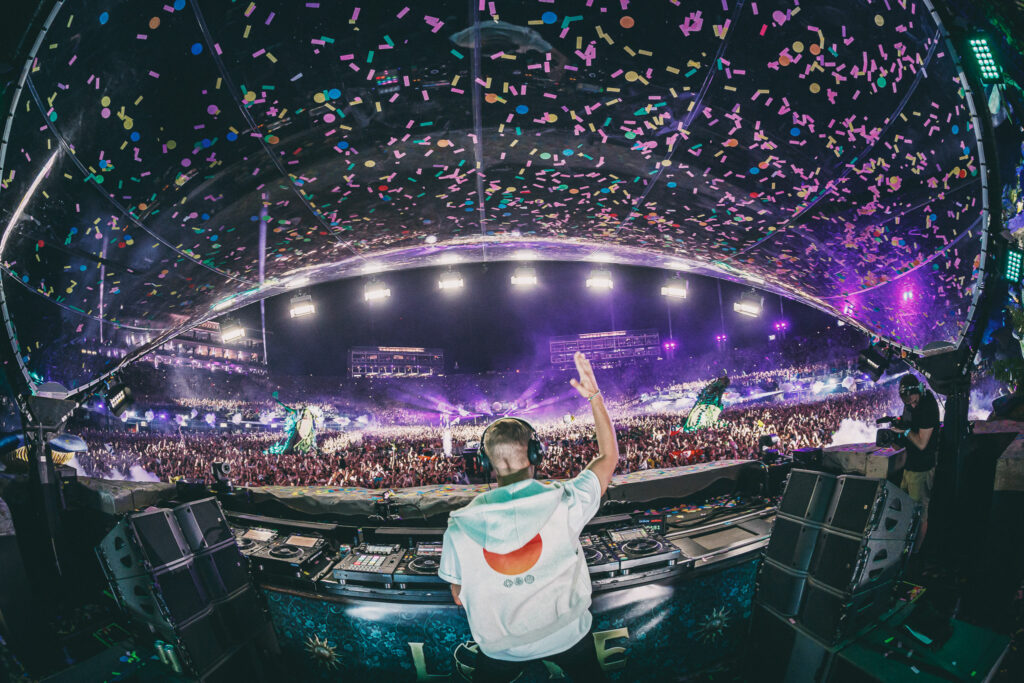
© In Photo: Armin van Buuren. (PH. Bart Heemskerk)
Your music and style gained wide recognition through the Radio ID&T program, also available online. At the time, you were very foresighted in understanding the potential of this medium. Was there a moment when you realized that the world’s eyes were on your music?
I’m not sure if there was ever that sudden realization, because I feel like my “rise to stardom” went very gradually. Nowadays, you can become a global star overnight just because a track of yours goes viral on social media. That was never a thing back in the day.
If there ever was such a realization, it would’ve been when I was voted the #1 DJ in the world for the first time or when I was nominated for a Grammy with “This Is What It Feels Like”. But what matters to me is how my fans perceive my music and that I inspire and unite them with all I do. Those awards are a great honor, but they’re not what I’m in this business for.
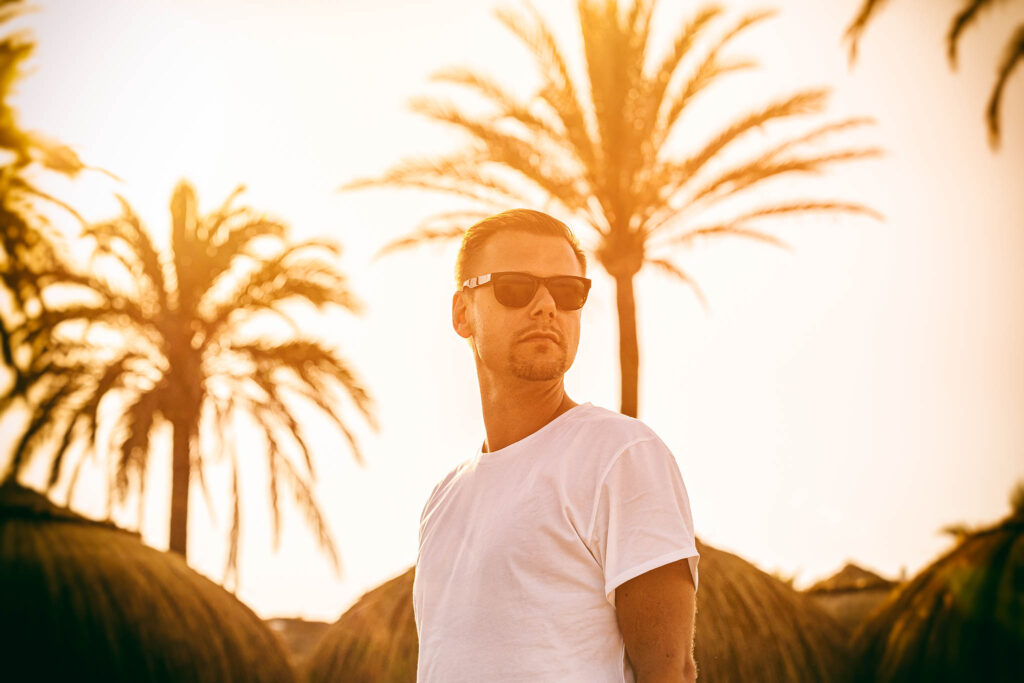
© In Photo: Armin van Buuren. (PH. Bart Heemskerk)
Another interesting thing that stands out from your answers is your strong connection with your fans and trance music lovers in general. Is this the most important thing to be considered a “good DJ”?
First and foremost, it’s important to mention is what makes someone a good DJ. Are you a good DJ if you’re technically impeccable? Are you a good DJ if you know what track to play when? Though having the technical skill and aptitude is definitely important, I lean more toward the latter. This is because I feel that, as a DJ, you are meant to offer an experience.
People visit your shows with expectation of being blown away, having a good time and getting to lose themselves in the music. To be able to give them what they need, you need to be attuned to their desires and connected to the people and the fans that come to see you play. So having that connection isn’t the only thing that constitutes a good DJ, but I do believe it plays a major part.
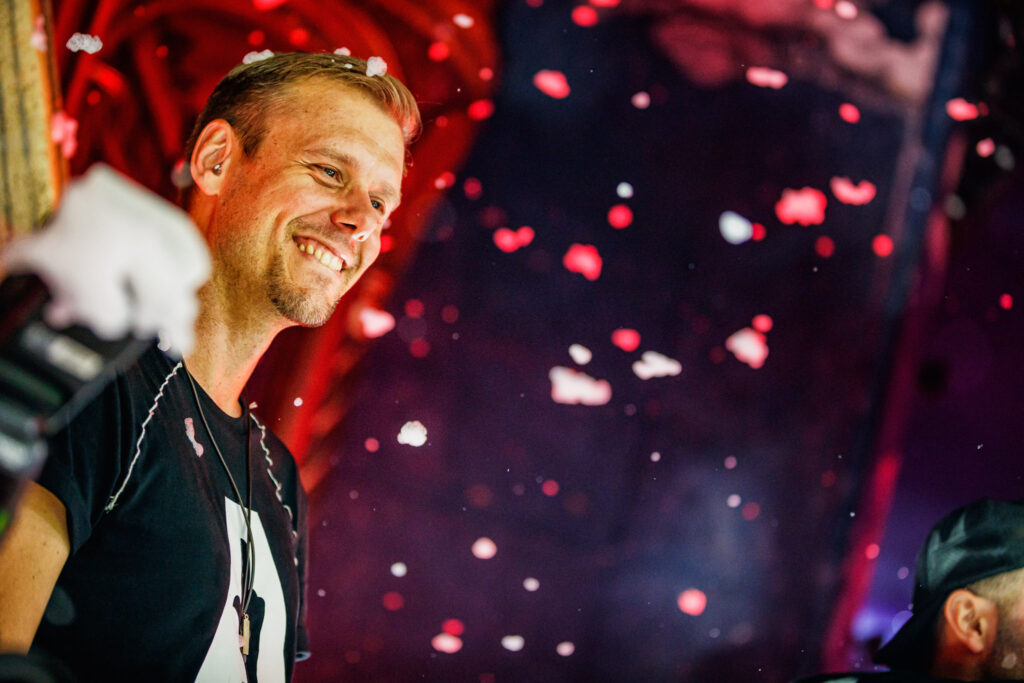
© In Photo: Armin van Buuren. (PH. Bart Heemskerk)
